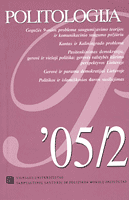Geopolitinių kodų struktūra ir dinamika
Geopolitical Codes: Structure and Dynamics
Author(s): Nortautas Statkus, Egidijus MotiekaSubject(s): Politics / Political Sciences
Published by: Vilniaus universiteto leidykla & VU Tarptautinių santykių ir politikos mokslų institutas
Keywords: political elite; geopolitics and geostrategy; geopolitization of elementary political issues; Lithuania's geopolitical situation; geohistorical tendencies of Lithuania; concept of the geopolitical code;
Summary/Abstract: According to the small states' political elite, the true geopolitics and geostrategy can be carried out by the great powers that pursue the main objective - to retain their territorial positions, multiply influence and implement the territorial expansion, alone. However, the parameters that comprise what the state power is appears to mean nothing as such, unless the strategies of development of one state or another have not been mulled over and formulated, and the potential of the state power and the means and objectives to use it have not been fully embraced. Thus, a small state, that seeks to survive first of all (create defensive survival systems), tries to understand global geopolitical schemes and their historical transformation in the same manner as the great powers do. Even when the small states have no direct influence on the great politics, the small states should know who and how manipulates them, and understand all this in the overall regional and global context. Such an understanding creates grounds for the small state to form not only the politics of "reacting" to what happens, but also provides the ability to "produce" politics. Such kind of politics is rare among the small states. Therefore the aim of this research is - to try to understand the situation of Lithuania in the global power system. Is essence this implies the geopolitization of elementary political issues, their promotion onto another, supranational, level. Quite naturally, this makes one look through the geopolitical constants and Lithuania's geopolitical situation, in reference to the geohistorical tendencies of Lithuania and the neighboring countries and strategic orientations of their politics. The concept of the geopolitical code so far has been underdeveloped. Up until now, the research object and the methodology of research has not been widely accepted. Therefore, this article aims to discuss the concept of the geopolitical code in a more elaborate manner. Besides, it is applied to the research of the geopolitical situation of Lithuania and the neighboring states.
Journal: Politologija
- Issue Year: 2003
- Issue No: 1 (29)
- Page Range: 59-109
- Page Count: 51
- Language: Lithuanian

